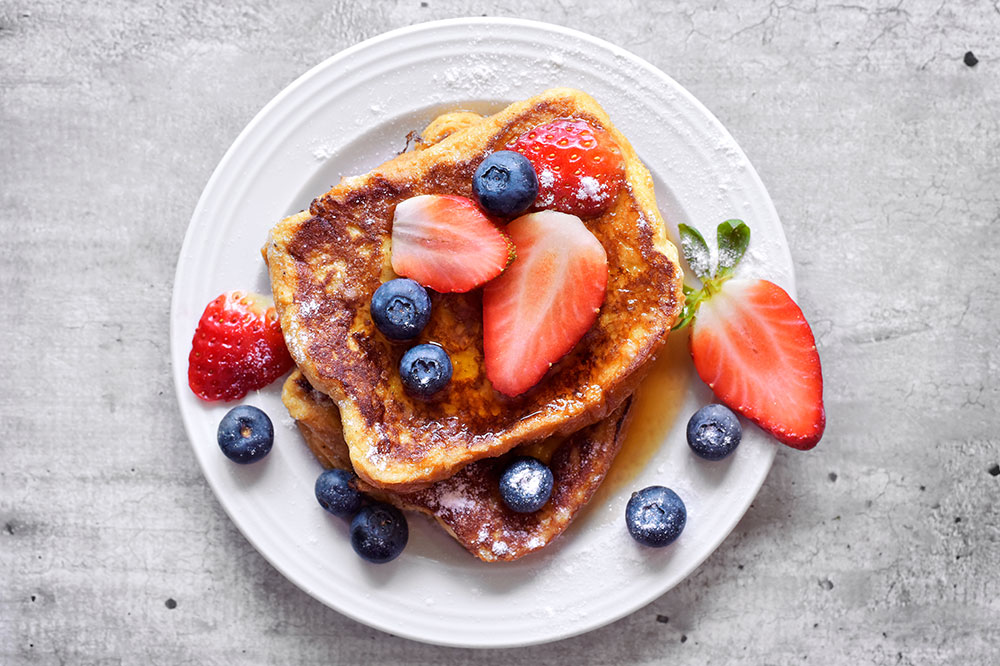French Toast – The Original Recipe
French toast, often called eggy bread or gypsy toast, is a popular breakfast item made with bread slices dipped in an egg-and-milk mixture and then fried till golden brown. This dish has been loved for ages, and different versions can be found in many different cultures. There are countless ways to enjoy French toast, from sweet additions to savory ones. Let’s look at French toast’s cultural significance and offer advice on the original French toast recipe.

Here is the original French toast recipe that serves four people:
Ingredients
- Eight slices of bread, preferably old bread
- Four eggs
- 100 ml of milk
- Vanilla extract, 1/2 tsp
- 1/2 tsp ground cinnamon
- 1/4 teaspoon salt
- Oil or butter for frying
Instructions
- Beat the eggs with a fork or a whisk in a large bowl. Mix thoroughly after adding the milk, vanilla essence, cinnamon, and salt.
- Make sure each piece of bread is well covered on both sides by dipping it into the egg mixture.
- A non-stick frying pan should be preheated over medium-high heat with a tiny amount of butter or oil added.
- Fry the coated bread slices on each side for two to three minutes or until golden brown.
- Continue until all the French toast is cooked using the remaining slices of bread.
- Serve hot with your preferred garnishes, such as whipped cream, syrup, powdered sugar, or fresh fruit.
Tips for making the perfect French toast
This ideal quick breakfast can be challenging to create, despite how easy it may look. Here are some tips:
- Use stale bread
A day-old bread or stale bread absorbs the egg mixture better without crumbling, making it the finest choice for French toast. Fresh bread cannot hold up during cooking if it gets too wet. - Use thick slices of bread
Thick slices of bread will cook more thoroughly and have an excellent texture overall. - Bread soak
To ensure that each piece of bread is completely coated, soak it in the egg mixture for at least 30 seconds on each side. - Don’t over-saturate the bread
While it’s crucial to ensure that the bread is completely covered in the egg mixture, avoid over-saturating it to prevent the bread from becoming soggy and crumbling. - Use a hot pan
To guarantee that the bread cooks evenly and doesn’t stick, heat the pan to a medium temperature before adding the bread. - Use butter or oil
Use butter or oil to prevent your French toast from sticking to the pan and to give it a wonderful golden brown hue. - Cook until golden brown
Cook each slice of French toast for 2-3 minutes on each side or until it is crisp and golden brown. Avoid frying it for too long, as the bread may become hard and crispy. - Keep it warm
Make a big batch of French toast and keep it warm in a 200°F (93°C) oven until you’re ready to serve it.
French toast variations and twists
Experiment with other alterations to the traditional French toast recipe.
- French toast with a cinnamon roll twist
To make cinnamon roll French toast, dip slices in the egg mixture and cook them just like the conventional French toast. - French toast with Nutella stuffing
Spread two slices of bread liberally with Nutella and cook it. - Apple pie French toast
Spread two slices of bread with a mixture of softened cream cheese, apple pie filling, and cinnamon. Cook and serve with whipped cream. - French toast with croissants
For a buttery and flaky variation on the classic, use croissants instead of bread. - Pumpkin spice French toast
Whisk pumpkin puree and pumpkin pie spice into your egg mixture for a seasonal variation. And follow the same method of a traditional French toast. - Monte Cristo French toast
The ingredients for Monte Cristo French toast are two slices of bread, ham, turkey, and Swiss cheese dipped in the egg mixture. - S’mores French toast
Spread Nutella and marshmallow fluff between two slices of bread, cook as you would traditional French toast, and top with graham crackers for a s’mores-inspired breakfast treat.
These are just a handful of the numerous modifications and alterations you may make to French toast. Use your imagination and experiment with various ingredients to create your own French toast recipe!
French toast as a cultural tradition
Many nations now consider French toast to be a cultural institution. This meal is also referred to as “lost bread” or “pain perdu” because it was initially created to use stale bread that would otherwise be thrown away. Nowadays, it’s a well-liked breakfast and dessert dish frequently topped with a variety of sweet ingredients like powdered sugar, jam, or caramel sauce.
A popular breakfast item, french toast is frequently served at diners and restaurants nationwide. It is a breakfast staple, and numerous families have unique recipes handed down through the generations.
French toast is a flexible food that can be tailored to your preferences. Although the traditional recipe has undergone many changes and additions, the original French toast recipe is still loved. Using simple ingredients, you can make an excellent, filling breakfast that will energize you throughout the day.